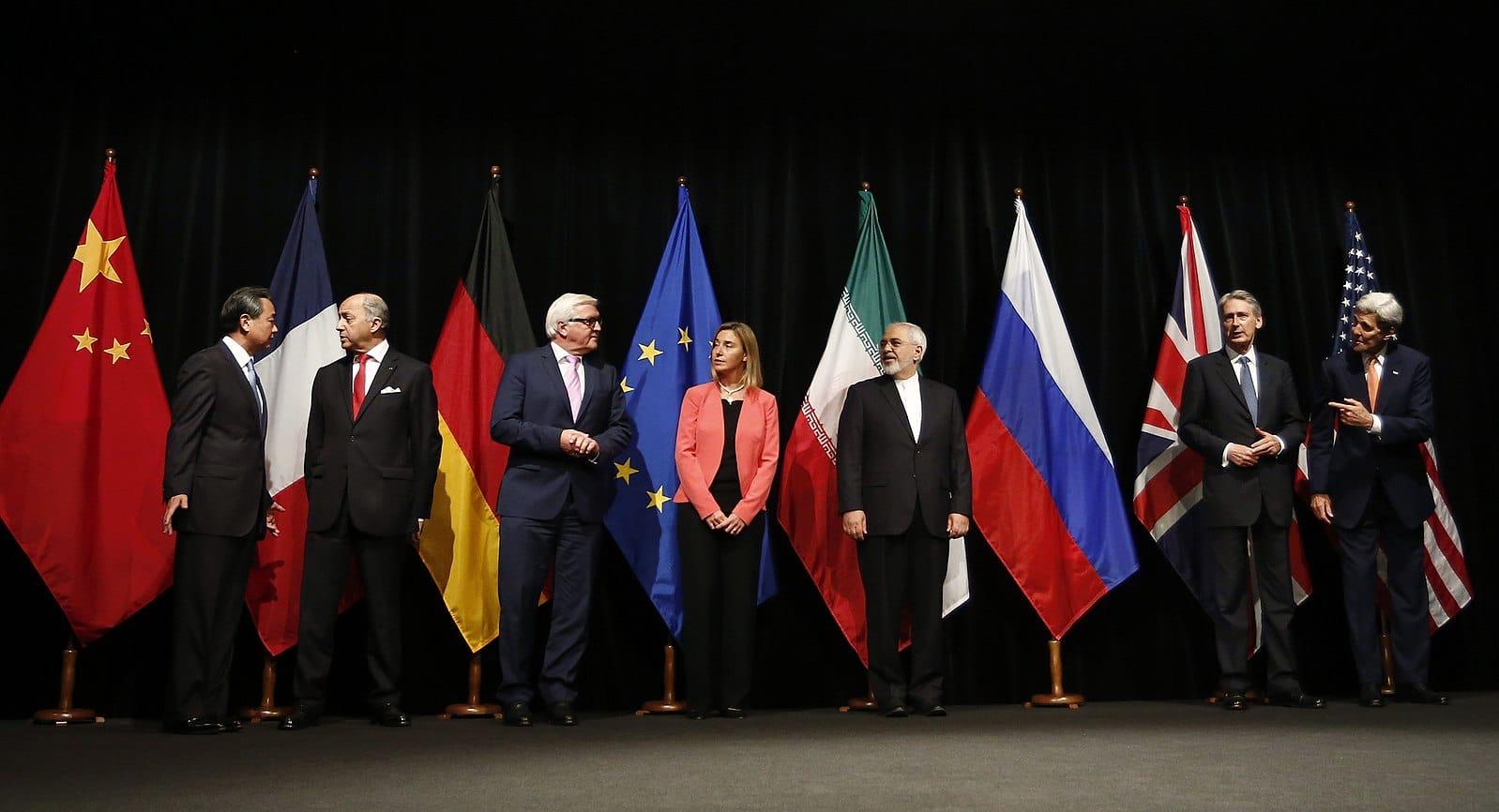Welcome to our roundup of news and current events related to ethics and international affairs! Here’s some of what we’ve been reading this past month:
 Officials announcing the Joint Comprehensive Plan of Action in Vienna on July 14, 2015. Photo credit: Austrian Federal Ministry for Europe, Integration and Foreign Affairs via Wikimedia Commons
Officials announcing the Joint Comprehensive Plan of Action in Vienna on July 14, 2015. Photo credit: Austrian Federal Ministry for Europe, Integration and Foreign Affairs via Wikimedia Commons
CBS News: Biden says U.S. won't lift sanctions until Iran halts uranium enrichment
In his first interview on network news since his inauguration, President Biden said his administration will not lift sanctions on Iran to get it back to the negotiating table. Instead, he expects Iran to stop enriching uranium before the two countries can negotiate U.S. reentry into a 2015 nuclear agreement, which former President Trump left in 2018. This conflicts with Supreme Leader Ayatollah Ali Khamenei's same day announcement that the U.S. must lift sanctions before Iran meets its commitments under the 2015 agreement.
Read more about the ethics of economic sanctions and their use as foreign policy tools in Ethics & International Affairs:
U.S. Economic Sanctions on Cuba in the context of the Pandemic COVID-19 (December 2020)
Political Effectiveness, Negative Externalities, and the Ethics of Economic Sanctions (2019: Volume 33.3)
The Alternatives to War: From Sanctions to Nonviolence, with James Pattison (October 2018)
 Rohingya refugee camp in Cox's Bazaar, Bangladesh. Photo credit: Masum-al-hasan Rocky via Wikimedia Commons
Rohingya refugee camp in Cox's Bazaar, Bangladesh. Photo credit: Masum-al-hasan Rocky via Wikimedia Commons
Radio Free Asia: In Power Grab, Myanmar's Generals Deal Rohingya Coup de Grace
As Myanmar experiences massive pro-democracy protests against the military's February 1 coup d'état, the plight of the 1 million Rohingya refugees living in neighboring Bangladesh only continues. Following this power grab by the same military which brutally drove them from their native Rakhine State in 2017, the prospect of return has been made all but unimaginable in the near future. Those few refugees who have been allowed to return have been put in camps and handed National Verification Cards identifying them as "stateless."
Read more about Southeast Asian politics and the ethics of displacement in Ethics & International Affairs:
Finding Refuge through Employment: Worker Visas as a Complementary Pathway for Refugee Resettlement (2020: Volume 34.4)
Briefly Noted: Human Rights and Participatory Politics in Southeast Asia by Catherine Renshaw (October 2020)
Sri Lanka 2.0: Independent Inquiry Shows UN “Systemic Failure” in Myanmar (July 2019)
 Protests in Saint Petersburg in late January 2021. Photo credit: Bestalex via Wikimedia Commons
Protests in Saint Petersburg in late January 2021. Photo credit: Bestalex via Wikimedia Commons
Reuters: 'The spring will be ours' - freed protesters in Russia say ready to march again
The last few weeks have seen Russia's largest protests in recent memory and the detaining of over 11,000 protestors. After the poisoning and recent arrest of main Russian opposition leader Alexei Navalny, three weekends of nationwide, unsanctioned protests have made many wonder whether this is a watershed in Putin's twenty-year rule. The ultimate political significance of this energy and enthusiasm has yet to be decided.
Read more about Russian politics and the ethics of civil disobedience in Ethics & International Affairs:
The Ethics of (Un)Civil Resistance (2019: Volume 33.3)
Backfire: The Dark Side of Nonviolent Resistance (2018: Volume 32.3)
Russia and the Liberal World Order (2018: Volume 32.1)
 Photo credit: U.S. Secretary of Defense via Flickr
Photo credit: U.S. Secretary of Defense via Flickr
Bloomberg: AstraZeneca Shots Start to Arrive in EU After Vaccination Chaos
More shots of the AstraZeneca coronavirus vaccine are finally arriving in the EU after a slow and confusing start to the bloc's vaccination drive. The monumental difficulties of this global inoculation campaign both strain and expose the various systems of trade, infrastructure, and healthcare in place around the world. Tangible political controversy and consequences are coming from slow vaccination campaigns in Europe and the U.S., especially when compared to the relatively successful COVID-19 responses of Israel, Australia and New Zealand, and much of East Asia.
Read more about the ethics of global health and trade in Ethics & International Affairs:
Freedom and Justice in Trade Governance (2020: Volume 34.3)
COVID-19, the UN, and Dispersed Global Health Security (2020: Volume 34.3)
Global Health Governance in International Society by Jeremy Youde (2019: Volume 33.2)